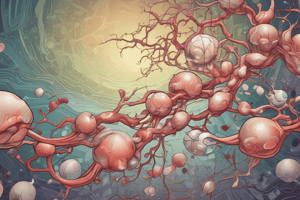Podcast
Questions and Answers
What is the most common cause of acromegaly in patients?
What is the most common cause of acromegaly in patients?
- Non-pituitary tumors
- Excessive physical activity
- Genetic factors
- Benign tumors of the pituitary gland (correct)
Which symptom is NOT typically associated with acromegaly?
Which symptom is NOT typically associated with acromegaly?
- Protruding jaw
- Thickened ribs
- Decreased perspiration (correct)
- Coarse facial features
Which diagnostic method is NOT used for diagnosing acromegaly?
Which diagnostic method is NOT used for diagnosing acromegaly?
- Blood tests
- X-rays
- MRI scans (correct)
- Serial photos
What hormone is typically elevated in patients with acromegaly due to pituitary adenomas?
What hormone is typically elevated in patients with acromegaly due to pituitary adenomas?
In addition to pituitary tumors, what type of tumors can also lead to acromegaly by producing GHRH?
In addition to pituitary tumors, what type of tumors can also lead to acromegaly by producing GHRH?
Which condition is associated with excessive sweating?
Which condition is associated with excessive sweating?
What symptom is commonly associated with hypothyroidism?
What symptom is commonly associated with hypothyroidism?
What is the pathological basis for hormone deficiency?
What is the pathological basis for hormone deficiency?
What symptom is associated with hyperglycemia?
What symptom is associated with hyperglycemia?
Which clinical sign is indicative of a functioning neoplasm of the endocrine gland?
Which clinical sign is indicative of a functioning neoplasm of the endocrine gland?
What symptom may be caused by inflammation of the pituitary gland?
What symptom may be caused by inflammation of the pituitary gland?
What pathological feature is indicated by bitemporal hemianopia?
What pathological feature is indicated by bitemporal hemianopia?
Which condition is a common cause of excessive thirst in patients?
Which condition is a common cause of excessive thirst in patients?
What is a primary effect of excessive growth hormone production by the pituitary gland?
What is a primary effect of excessive growth hormone production by the pituitary gland?
Which hormone is produced by the anterior pituitary and plays a key role in growth and metabolism?
Which hormone is produced by the anterior pituitary and plays a key role in growth and metabolism?
Acromegaly is primarily caused by an excess of which of the following hormones?
Acromegaly is primarily caused by an excess of which of the following hormones?
In the context of endocrine disorders, what does 'hyperfunction' refer to?
In the context of endocrine disorders, what does 'hyperfunction' refer to?
What condition may arise from adrenocortical hyperplasia or neoplasia?
What condition may arise from adrenocortical hyperplasia or neoplasia?
How is the anterior pituitary connected to the hypothalamus?
How is the anterior pituitary connected to the hypothalamus?
What is a potential consequence of insulin deficiency in diabetes mellitus?
What is a potential consequence of insulin deficiency in diabetes mellitus?
Which of the following best describes a potential factor in multiple endocrine neoplasia (MEN) syndrome?
Which of the following best describes a potential factor in multiple endocrine neoplasia (MEN) syndrome?
Flashcards are hidden until you start studying
Study Notes
Endocrine Pathology Overview
- Key disorders include hyperfunction and hypofunction of glands, as well as benign and malignant tumors causing disordered function.
- Endocrine glands can be independent; hypersecretion from one gland may overactivate another.
- Conditions can be associated with multiple endocrine neoplasia (MEN) syndrome or organ-specific autoimmune diseases.
Pituitary Gland Functions
- Anterior pituitary connects to the hypothalamus via portal vessels and produces six key peptide hormones:
- Prolactin
- Growth Hormone (GH)
- Thyroid Stimulating Hormone (TSH)
- Adrenocorticotropic Hormone (ACTH)
- Follicle-Stimulating Hormone (FSH)
- Luteinizing Hormone (LH)
Growth Hormone (GH)
- GH, also known as somatotropic hormone, influences growth and metabolism, acting on all body cells.
- Short-term metabolic effects include:
- Anabolic effect on protein metabolism, increasing synthesis rates.
- Catabolic fat metabolism, mobilizing fatty acids for energy.
- Hyperglycemic carbohydrate metabolism, decreasing glucose utilization.
Acromegaly
- Acromegaly is caused by excess GH production, typically from a benign pituitary tumor (adenoma).
- Occurs predominantly in middle-aged adults (approx. 6 in 100,000).
- Symptoms include:
- Enlargement of hands and feet
- Coarse facial features
- Joint pain and degenerative arthritis
- Protruding jaw and deepening voice
- Enlarged heart and thickened ribs
Non-Pituitary Tumors and Acromegaly
- Some cases arise from tumors in pancreas, lungs, or adrenal glands, which stimulate GH production indirectly.
Symptoms of Acromegaly
- Thickening of skin and coarse body hair
- Increased perspiration and body odor
- Enlargement of various organs, such as heart
- Impotence in men and irregular menstrual cycles in women
- Fatigue, headaches, and potential vision loss
Diagnosis of Acromegaly
- Observation through serial photographs over time to track physical changes.
- X-rays to identify bone thickening, particularly in the skull.
- Blood tests to measure GH levels.
Clinical Manifestations Related to Hormonal Disorders
- Common symptoms linked to hormonal excess include headaches, dizziness, flushing, and palpitations.
- Symptoms tied to hormone deficiency manifest as fatigue, weight changes, and altered libido.
- Pituitary dysfunction may lead to bitemporal hemianopia due to tumor effects on surrounding structures.
Additional Endocrine Pathologies
- Symptoms of DM include excessive thirst and urination, while hypoglycemia symptoms range from confusion to consciousness loss.
- Hormonal imbalances can lead to conditions like hyperthyroidism, characterized by excessive sweating and tremors.
Studying That Suits You
Use AI to generate personalized quizzes and flashcards to suit your learning preferences.




